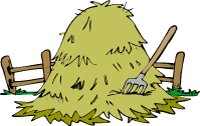Horse Care Tips
Horse Care Tips -
Small Bites, easy to digest
Tips for winter! Here are a couple of suggestions to make it less painful.
I use an old spaghetti strainer to strain out hay and stuff from the water buckets or water tanks. It also works well when trying to get broken ice chunks out of same. Your hands stay warmer.
In very cold climates, to save on your electric bill, you should insulate your water trough. The easiest way to do this is to use a chest freezer that no longer works. The freezer is well insulated. Cut a hole in the lid and keep the water bucket in it.
To scrub out a water bucket on the spot, I take a handful of hay; and just scrub the bucket with that. It makes an easy clean up, and the hay rinses right out with all the gunk. Then I don't have to worry about finding a brush or sponge to clean with

A treat that's too large to be easily swallowed but too small to require chewing can end up lodged in the horse's throat, causing choke, a serious and sometimes fatal condition in horses.
Horse Care Tips To Deal With Choke
Small apples measuring 2 to 2 1/2 inches in diameter and the butt ends of large carrots represent this in-between size.

Cut all treats into safe sizes. Nothing larger than golf-ball size is a good rule of thumb for apples and nothing bigger than your thumb for carrots. If you can't cut an apple down to size, smash it under your heel, scoop up the pulpy mess, and offer the "prechewed" treat to your horse.
He won't mind a bit of dirt, and you won't have to worry about choke. For big carrots, bite off an inch at a time, and offer the pieces to your horse.

More Horse Care Tips -
The Useless Helmet
Most modern helmets feature a specialized foam layer that absorbs the impact of a blow to the head, intercepting the shock before it can be transmitted to the brain. In other words, the foam gets crushed so your head won't. The helmet doesn't "recover" from the crushing blow, however, so it can't absorb subsequent impacts as effectively. Although the damage to the foam may not be visible, take it for granted that a helmet that has protected your head through one serious contact can no longer offer the original level of protection.
After a helmet saves your skull, it's ready for retirement. A minor spill in which your rear takes the brunt of the blow probably won't harm a helmet, but if you hit your head hard enough to be thankful you had a helmet on, it needs to be replaced. Some manufacturers have replacement programs in which you can send in an old helmet for a discount on a new one, so it's worth a call to find out if you qualify.
Move From Horse Care Tips Back To General Horse Care.
Move Back To Living With Horses Home Page
Products
|
|
|

